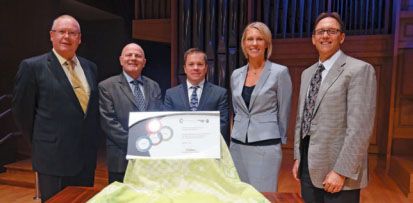Waters Centers of Innovation Programme Honours Colorado State University Laboratory
Waters Corporation (Massachusetts, USA) has announced the addition of the Colorado State University Fort Collins Proteomics and Metabolomics facility to its Centers of Innovation Programme.
Waters Corporation (Massachusetts, USA) has announced the addition of the Colorado State University Fort Collins Proteomics and Metabolomics facility to its Centers of Innovation Programme. Directed by Dr Jessica Prenni, the facility is focused on the application of non-targeted proteomics and metabolomics using liquid chromatography coupled with mass spectrometry (LC–MS)in the areas of food, veterinary science, clinical, and microbacterial research. Alan Rudolph, Vice President for Research, Colorado State University, said: “We take pride and ownership that our discoveries will have a meaningful impact and we recognize the importance of partnerships with corporations like Waters. We’ve seen the impact on science that instrumentation - microfluidics separations, higher resolution, and the ability to look at complex mixtures - can have both here and abroad.”

(Left to right) Eric Fotheringham, Director - Waters Centers of Innovation Programme, Waters Corporation; Steven McDonough, General Manager - Western Business Operations, Waters Corporation; Dr Jim Murphy, Principal Research Scientist, Waters Corporation; Dr. Jessica Prenni, Director - Proteomics and Metabolomics Facility, Colorado State University; and Dr. Alan Rudolph, Vice President - Research, Colorado State University. (Photo courtesy of Lauren Klamm, Colorado State University).

A Novel LC–QTOF-MS DIA Method for Pesticide Quantification and Screening in Agricultural Waters
May 8th 2025Scientists from the University of Santiago de Compostela developed a liquid chromatography quadrupole time-of-flight mass spectrometry (LC–QTOF-MS) operated in data-independent acquisition (DIA) mode for pesticide quantification in agriculturally impacted waters.
Investigating 3D-Printable Stationary Phases in Liquid Chromatography
May 7th 20253D printing technology has potential in chromatography, but a major challenge is developing materials with both high porosity and robust mechanical properties. Recently, scientists compared the separation performances of eight different 3D printable stationary phases.

.png&w=3840&q=75)

.png&w=3840&q=75)



.png&w=3840&q=75)



.png&w=3840&q=75)












